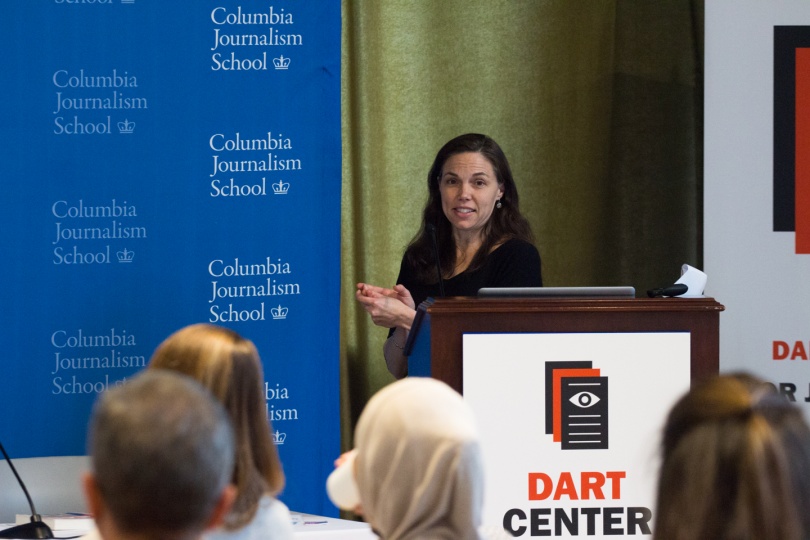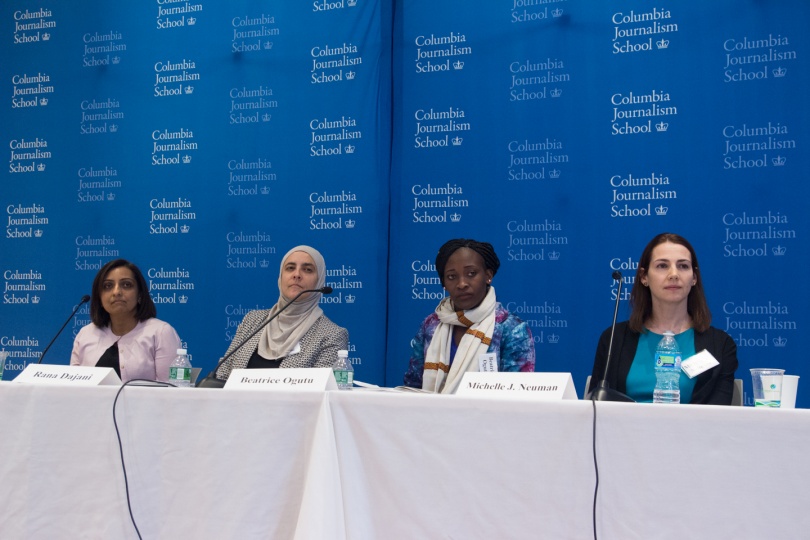Event Report: Early Childhood Experience & the Developing Brain
To help journalists and news organizations around the world improve their reporting on early childhood experience and brain development, the Dart Center organized a reporting institute for 45 journalists from 26 countries March 9-12, 2017 at Columbia Journalism School in New York City. Today, the Bernard van Leer Foundation launches Early Childhood Matters, its journal showcasing advances in early childhood development, which includes this report written by Karen Brown, senior reporter at New England Public Radio and a consultant on the project.

Lisa Guernsey, Director of the New America Foundation's Early Education Initiative, speaks on how technology affects the cognitive development and behavior of children as part of Dart's four-day reporting institute on early childhood experience and the developing brain.
When the organizers of the Global Journalism Institute on Early Childhood and the Developing Brain first put out the call for applicants, they assumed the appeal would be somewhat narrow. After all, how many journalists – so often on daily deadlines – would be willing to take almost a week out of their working lives to explore neuroscience, international policy, advocacy, and the craft of reporting on children and the brain?
As it turned out, 480 journalists from 96 countries applied to attend the institute, which took place at Columbia University in New York City and was organized by the Dart Center for Journalism and Trauma. Of them, 45 journalists from 26 countries were selected to spend four days in the sunny, capacious World Room at Columbia University’s School of Journalism, learning and sharing stories about the vulnerability and potential of early childhood.
‘From the applications, it was clear that for reporters across an astonishing range of beats – from local education to global refugee and migration crises – few issues are as pertinent as child development and the impact of violence and trauma on young minds’ said Bruce Shapiro, Executive Director of the Dart Center. ‘Journalists know they are the capillary system for public understanding of early childhood development. Yet so few are grounded in the basic science or have the opportunity to talk with colleagues about innovative ways of telling these important stories.’
This deep-dive into early childhood development began with a casual conversation. Shapiro was chatting with Jack Rosenthal, former president of the New York Times Company Foundation and long-time editor of the paper’s editorial page. Rosenthal had been thinking about new research into early brain science, the importance of the first few years of life, and the challenges facing so many of the world’s vulnerable children. He also knew that UNICEF had a keen interest in this kind of training. Rosenthal – who has helped organise dozens of journalism topic institutes over the years – put the two organizations together. Several other funders came on board – the Bernard van Leer Foundation, the Ford Foundation, the Jacobs Foundation and the Maria Cecilia Souto Vidigal Foundation.
Aisha Yousafzai, Rana Dajani, Beatrice Ogutu, and Michelle Neuman listen to a question about successful models of early childhood intervention.
A variety of perspectives
The Dart Center set about identifying experts in disciplines related to early childhood, making sure that they approached the most common questions from a variety of perspectives, and that these experts would be able to communicate easily with journalists. The final programme included an introduction to early childhood followed by a day on science, a day on policy, and a day on the craft of reporting on these issues for a wide range of print, broadcast, and online outlets. The topics covered included:
- evidence on how poverty and ‘toxic stress’ affect the architecture of the developing brain
- how neuroscience helped move early childhood up the priority list of international aid agencies
- how the field of epigenetics is shedding light on the ways negative and positive experiences in childhood can change gene expression
- the common components of resilience in children – from refugees to abuse survivors – and the role of societal systems, family connections, and the community in supporting it
- the economic argument for investing in early childhood
- small-scale programmes for vulnerable children, such as one in Jordan that encourages reading and another in East Africa on non-violent parenting
- the surprising ways in which technology interacts with the developing brain.
There were some fiery moments – after all, this was a roomful of journalists. For example, when an international policy director put out a ‘call to action’ urging the reporters to work alongside agencies in furthering the goals of early childhood programmes, several participants made clear that journalists are independent actors who should deliver information, not partner with the agencies they report on.
Or when one presenter explained the best way to ‘frame’ messages on childhood welfare policies in order to sway the largest number of people (for example, how to get people to stop blaming parents), some journalists took issue with the assumption that they should advocate any particular message at all.
‘This institute was an unusual attempt to build bridges between news professionals, early childhood scientists and policy advocates’, the Dart Center’s Bruce Shapiro said. ‘Too often, well-intentioned advocates forget that journalists’ credibility depends upon our independence. We can be crusaders through investigation and storytelling. But we can’t be propagandists. So the focus of this Global Reporting Institute wasn’t really on “messages”, it was on giving reporters a baseline level of knowledge, forging relationships with experts who can be sources and advisers, and finding fresh ways of telling these vitally important stories.’
What did journalists take home to their newsrooms, their home offices (many were freelance writers), and the divergent realities of their 26 countries?
Story ideas, for one, in the form of emerging science and debates over the funding, efficacy, politics and timing of child-related policies. Daily break-out sessions enabled the journalists to brainstorm ways to individualise stories for each audience – from the trauma of the Zika and Ebola outbreaks in Brazil and Sierra Leone, to a childcare crisis in Chile, to the stark economic inequality in the USA.
Perhaps more importantly, the journalists who attended said they came away with more context and background to inform future stories – and an understanding that programs meant to help vulnerable children and their parents should be science-based, recognize the plasticity of the young brain, and tap into local sources of resilience. The hope is that the institute will encourage more nuance and context in worldwide media coverage of early childhood development.

































































































